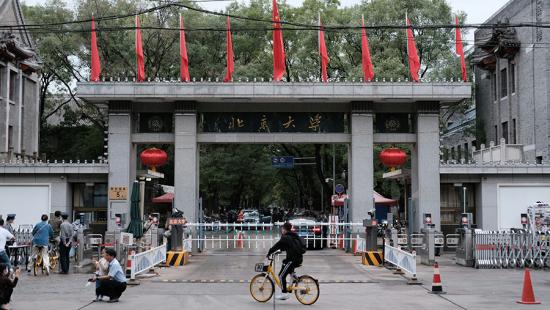Virtual CRP Graduate Open House for Admitted Students, Spring 2024

City and Regional Planning students, fall 2023. image / Anson Wigner
Overview
Virtual Open House
Congratulations on your admission to Cornell University! We are thrilled at the prospect of seeing you here in Ithaca as a student in City and Regional Planning in August and look forward to helping you decide on this next important step in your educational career. Please join us for this year's virtual open house on Friday, March 22 to learn more about us. This is your chance to find out more about the unique opportunities available to our students, meet our faculty, and ask questions of current students.
About the Department
Read more about the City and Regional Planning Department
Historic Sibley Hall
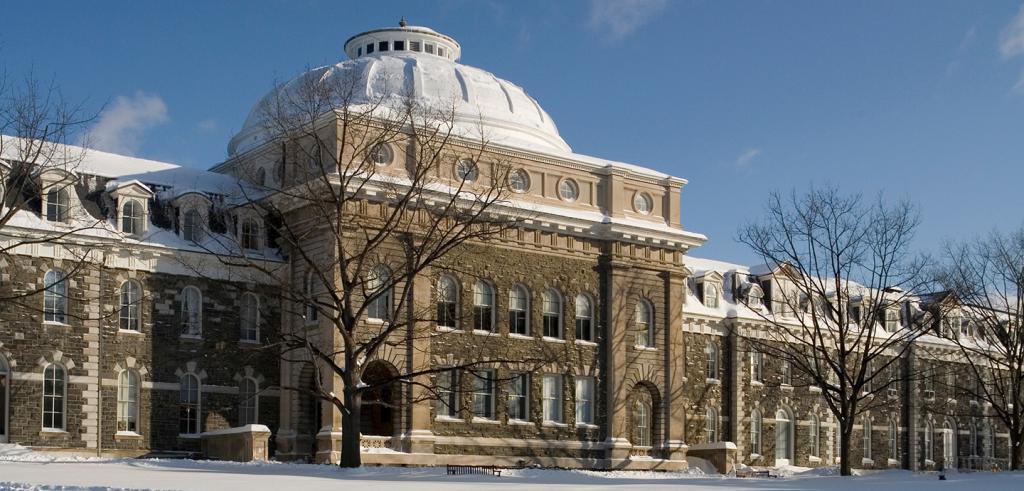
Schedule
9 a.m. Welcome and Faculty Introductions with Department Chair Sophie Oldfield and Jennifer Minner, Director of Graduate Studies
10 a.m. Virtual coffee chat about faculty-led research
10:30 a.m. Student Organizations Panel for master's degree students — Hear short presentations given by representatives of organizations such as the Women's Planning Forum (WPF), Design Connect, International Planning Students Organization (IPSO), Cornell Regional Science Student Association (CRSS), Organization of Cornell Planners (OCP), and more
10:30 a.m. Ph.D. break out session with Cornell Association of Ph.D. Planners (CAP) and Sophie Oldfield
11 a.m. Student Life Panel — Meet a panel of current master's CRP students and participate in a Q&A about student life at Cornell and in Ithaca
—BREAK—
12:25 p.m. Colloquium Lecture, Beyond NIMBY: Antigrowth Activism, Political Ideology, and the Origins of the Housing Crisis with speaker Jake Anbinder, Klarman Fellow at Cornell University
2:15–3 p.m. Academic Programs
Break out into informational sessions about the Historic Preservation Planning, Regional Planning, and Regional Science programs
3:15–4:30 p.m. Office Hours — Drop in to meet with department and college representatives including faculty to learn about their courses, ask questions about research, and find out more about the department
- Faculty
- Career Services
- Current Students
- International Planning Students Organization (IPSO)
Meet the Faculty
City and Regional Planning Faculty Videos
CRP Assistant Professor Linda Shi
CRP Professor Neema Kudva, Senior Associate Dean for Academic Affairs and House Dean for Carl Becker House
CRP Professor Mildred Warner, Coordinator of the Ph.D. Program, Director of the Local Government Restructuring Lab, Professor in the Department of Global Development, CALS, and Director of the Polson Institute for Global Development
CRP Associate Professor Stephan Schmidt, Director of the M.R.P. Program
Meet the Students
City and Regional Planning Student Videos
Rama Ramachandran (M.R.P. '25)
Megha Singh (M.R.P. '25)
Hanyu Zeng (M.R.P. '25)
Yizhou Wang (M.R.P. '25)
Kami Cai – (M.S. HPP '24)
Henny Angkasa – (M.S. HPP '24)
Ella Redmond – (M.S. RS '25)
Spotlight on Internships
The Department of City and Regional Planning is host to numerous resources that help current students connect with engaging opportunities beyond Cornell's campus.
AAP Career Development
The AAP Career Development Team serves as a resource for students seeking internships and employment, as well as a resource for any career questions throughout that process. The office is available to provide support in the form of 1:1 advising, group workshops, job search strategies, connecting with alums, and career fairs. AAP Career Development is available to support all AAP students on their career journey.
CRP Professional Opportunity Program
Since 1990, the City and Regional Planning Department has partnered with many local, regional, and national organizations to offer summer internships to graduate students. Through the CRP Professional Opportunity Program, students who secure and confirm professional, planning-related internships and opportunities will be eligible for a stipend in addition to the internship compensation. Normally, the stipends are awarded to students between the first and second years in the M.R.P. and M.A. programs. The internship program provides students with an opportunity to begin research in their specific field of interest and gain valuable first-hand experience.
Summer Travel Research Grants
While the department also has some funds available for summer travel associated with research, some students also pursue grants through the Mario Einaudi Center for International Studies to support summer work.
The following are examples of internships in which graduate students in CRP have participated.
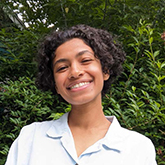
Majd Alsaif (M.R.P. '24)
Main Street America | Remote
For three months, I worked at Main Street America, a subsidiary of the National Trust for Historic Preservation, on the development of a tool to record and map underutilized and vacant properties across main street districts. As part of the MSA Research team, I led a pilot project with eight Main Street programs from a network of over 1,200 programs to establish what survey and user experience would be used for the final version of the tool.
We began by selecting eight communities from 120 interested participants, then developed a survey with their feedback and a training session on how to conduct the mapping. During the surveying period, we had some expectations on what the findings might be based on prior MSA research, yet we still came out with much richer information on the different kinds of main streets. The pilot overall resulted in extremely enthusiastic experiences and extensive feedback on the types of data communities wanted to record, the surveying experiences, and desired uses for the collected data. The final tool is being developed with a contractor and should be available to all 1200-plus communities by the end of 2023.
Seeing this pilot through from start to finish and watching the initiation of the final tool's development is incredibly gratifying. The highlight of my experience this summer has truly been being able to meet with and talk to the real community leaders working on these issues. Working at a high level — whether in the third sector or the public sector — can often mean being disconnected from the realities on the ground. Talking to communities not only taught me what these realities looked like with different contexts and variables but also grounded my own practice and beliefs as a planner and preservationist. Now, completing my studies and catching a glimpse of the community of practice that I am a part of, I am more, so much more inspired and excited to work and develop new approaches to preservation in response to urban challenges.

Dingkun Hu (M.R.P. '24)
Cornell Cooperative Extension; Land Planning Hawaii | Remote
Throughout the summer, I acted as a farmland protection intern at Cornell Cooperative Extension and simultaneously contributed as a planning intern at Land Planning Hawaii. My dual internships at two distinct agencies not only allowed me to learn the differences between non-profit organizations and private enterprises but also illuminated two distinct planning industries. At CCE, I conducted an extensive spectrum of research encompassing both online exploration and field visits, delving into the agricultural landscape of the Town of Caroline. This encompassed an in-depth examination of strategies outlined in NYS Town Agricultural plans employed by towns of comparable sizes and exploration of farm-friendly policies that are primed to protect lands and foster agricultural activities. As the internship progressed, I drafted a comprehensive strategy, which I subsequently shared with the Town of Caroline Agriculture Committee. This repository of insights was intended to be considered for integration as a recommendation within the overarching blueprint for the town's development.
Concurrently, my remote internship with LPH provided me with a panoramic view of planning permit applications specific to the unique context of Hawaii. I learned different types of land use permits, including special permit requests, special management area assessments, county rezoning petitions, etc. The type of permit required is based on the client's intentions, parcel location, and the complex interplay of environmental elements. Moreover, this experience endowed me with the adeptness to adeptly navigate Hawaii County GIS platforms and other online repositories to extract invaluable land-related data. As I look back on these internships, I'm sure that this diverse experience has not only improved my skills in planning and research but has also sparked a long-lasting interest in navigating the complex aspects of sustainable development and land management.
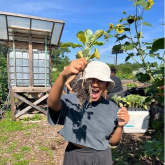
Aashka Patel (M.R.P./M.L.A. '25)
Sweet Water Foundation | Chicago, Illinois
In Englewood, a so-called blighted community on Chicago's South Side, the Sweet Water Foundation has been built as a leverage point, a model that demonstrates how we can create new forms of publics (spaces and emotions) and cultivate public trust at a neighborhood scale. I spent the summer in Chicago as a Global Urban Ecology Fellow and had the opportunity to place myself within the act of system change — a framework for disrupting the typical way of ordering and structuring systems. Through farming, education, art, research, and carpentry, the foundation employs regenerative and resourceful practices and is accountable not only to those among us today but to seven generations into the future. Every day at Sweet Water was completely different. The work done on-site depended on several known and unknown variables, including what the weather was like, who pulled up to the site, and how many hands we had on deck. Navigating the chaorder (chaos+order) required an understanding, respect, and connection with the local living systems and the land that is necessary for regeneration. Through a practice of routine, ritual, and reflection, we were able to embrace chaorder through our actions — actions which, over time, became grounded in our shared knowledge, values, and experiences. From farming to carpentry, Sweet Water has long been engaged in re-create-ing a neighborhood that has been blighted by environmental racism, redlining policies, school closures, and the food and medical apartheid. The goal has always been place-keeping…not just place-making.
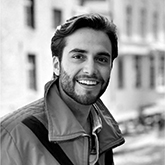
Andrés Castelo Rebeil (M.R.P. '24)
WSP | Washington DC
Working as a transportation planning intern at WSP was an incredibly rewarding experience. Throughout my three months at the company, I was exposed to a wide variety of tasks and projects spanning various disciplines beyond transportation itself. My role within the company consisted of identifying and analyzing potential environmental impacts of prospective transportation projects, reviewing community master plans and reports to inform transit-oriented development project plans, and analyzing utility conditions and local zoning ordinances to pinpoint optimal project locations. Beyond the wealth of knowledge gained, it was the people at WSP that made the whole experience invaluable. The working environment was highly collaborative, and support was constantly available. Additionally, both junior and senior employees were always willing to make time for one-on-one conversations, which facilitated networking opportunities within the company.
Overall, I am very pleased with my experience at WSP. Not only was this internship invaluable in applying and expanding my knowledge and skills, but it was also a great opportunity to meet and learn from the industry's finest professionals. For anyone aspiring to grow professionally in the field of planning, I would certainly recommend working within a similar organization.
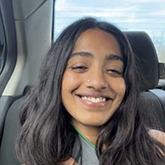
Shivani Lakshmi Aysola (M.R.P. '24)
Master's Thesis Research | Bangalore, India
My "internship" was nine weeks of fieldwork in Bangalore, India, and centered on the city's ecosystem of construction and demolition waste (CDW). I conducted dozens of site visits and interviewed over 30 practitioners across policy, architecture, construction, development, demolition, ecology, urbanism, and civil society, with a focus on unveiling the multifaceted web of concerns and challenges concerned with CDW. It was an incredibly fruitful experience to apply the tools and methodologies I learned at Cornell to investigate prescient issues a world away from the classroom. My research methodologies included crowdsourced data for mapping exercises, analysis of satellite imagery, and ecological ethnographies to investigate the dialectic between processes of urban growth and waste. The project has allowed me to think critically about people and processes embedded in the built environment while giving me the space to synthesize prior multidisciplinary experiences. Mixed methods and grounded theory analysis of the data I collected allowed me to leverage lessons learned against broader sociological theories, and it's been fun to bring everything together as part of my master's thesis. The experience allowed me to connect with incredible thought leaders and catalyzed my interest and passion for future field-based research. My sincere gratitude to John W. and Constance P. Reps, the Department of City and Regional Planning, and the Mario Einaudi Center for International Studies for their generous funding, without which this project would not have been possible.
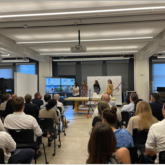
Angela Fernandes (M.A. HPP '23)
Robert A. M. Stern Architects | New York City, New York
During the summer of 2022, I worked as a Preservation Intern at Robert A.M. Stern Architects, based in Midtown Manhattan, New York City. With a history of over fifty years, the 200-person design firm has gained a reputation for a diversified portfolio of residential, commercial, and institutional projects spanning international boundaries. Every summer, the firm hosts a robust 12-week internship program involving extensive training for architecture students and recent graduates as professionals with an opportunity to contribute to ongoing projects and a range of educational sessions during the period to help them hone their software and design skills while also learning extensively about the organization of the firm and their most recent works. The highlight of the internship was Intern Design Day — a single, day-long design charrette with a team of fellow interns on a hypothetical design challenge, which ended with an opportunity to present ideas to the entire firm. As a preservation graduate, I was tasked with assisting with the development of a four-volume Historic Structures Report — more specifically, creating a complete set of detailed architectural drawings, including site plans, floor plans, elevations, and details, with the help of all the available archival plans and survey documentation.
Along with this, I helped the team edit text and assemble and edit imagery for all four volumes. Due to the integrative nature of the assignment, the project presented the opportunity to work across various teams, both internally and externally. Considering my past work experience, the internship validated my interest in preservation as a field that combined my architectural background with the technical knowledge, skills, and research of a historic preservationist.
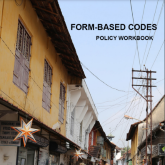
Ishan Keskar (M.R.P. '21)
World Resource Institute
My summer internship with the World Resource Institute (WRI) was an important step in the development of my professional career since it exposed me to the practical side of planning and provided me with a wide range of exciting challenges. I was one of the three interns who were based in the U.S. and helped the WRI India Team remotely. The project I worked on over the summer was centered on developing a policy framework for form-based codes for 100 chosen cities under the Smart Cities Mission. My primary task involved conducting case studies of various form-based codes that were already in use, synthesizing the best practices for the Indian context, and building GIS databases for spatial analysis. The interdisciplinary intern team taught me other important aspects of urban planning, i.e., public policy and public law. I got the chance to work in the Indian context, which is something I am passionate about, thanks to WRI's extensive network of global development stakeholders. With the exception of the occasional trip to the office in Washington, DC, this internship was entirely remote. The amazing work culture along with a healthy learning environment made the overall internship experience memorable.
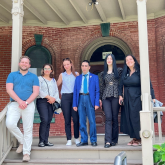
Jiaru Fang (M.R.P. '23)
University Circle Inc. | Cleveland, Ohio
This summer, I interned with University Circle Inc. in Cleveland, Ohio. I worked in the Community Development Department under Vice President Elise Yablonsky. During my time with UCI, I participated in the Community Development Benchmarking Project and researched and wrote a CDC and anchor district partner analysis as a reference. I also worked with other colleagues in transportation planning, community planning, and real estate analysis. And I was a volunteer in Wade Oval Wednesday and Saturday events. I enjoyed this summer with UCI in Cleveland, as it allowed me to get involved in community gatherings and planning.
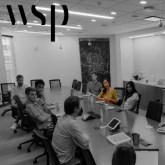
Mariam Fatima (M.R.P. '21)
WSP | Baltimore, Maryland
As an intern with the transportation planning group at WSP in Baltimore, I had the opportunity to work on a variety of meaningful and impactful projects. Not only did these projects expose me to the core of transportation planning and allow me to gain practical experience in the industry, but they also gave me the chance to contribute to the development of solutions that have the potential to positively impact communities. Through my internship, I was able to learn a range of valuable skills, including report writing, creating transport-related graphics, developing measures of effectiveness, and problem-solving with scarce data. I also had the opportunity to interact with clients and learn about grant writing and transportation in rural areas, giving me a well-rounded understanding of the transportation industry. If you are considering an internship in the transportation field, I highly recommend pursuing an opportunity like the one I had at WSP. Not only will you gain valuable experience and skills, but you'll also have the chance to make a difference and contribute to the development of transportation solutions that benefit communities.
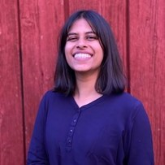
Swathi Suvarna (M.R.P. '23)
People's Action
People's Action is a non-profit national organization driven by local and state organizing. People's Action builds the power of poor and working people in rural, suburban, and urban areas through issue campaigns and elections. Over the summer of 2022, I did a remote internship with this organization. Working directly under People's Action's Research & Policy Manager Kai Thompson for the entire duration of my internship, I was responsible for researching and analyzing local, state, and federal guidelines and program content related to the availability, distribution, and expenditures of federal resources to local and state entities. As a summer intern, I compiled resources, guidelines, and reports to uncover the best practices and strategies for leveraging funds coming from the American Rescue Plan Act (ARPA) and Infrastructure Investment & Jobs Act. This research helped inform newly emerging policy and research projects with People's Action and member organizations investigating the interplay between federal, state, and local policy.
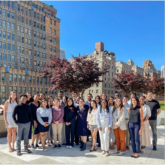
Tejal Shrotriya (M.A. HPP '21)
Robert AM Stern Architects | New York City, New York
I spent my last summer interning at Robert A.M. Stern Architects (RAMSA), a private multi-disciplinary organization with 200 employees based in New York City. Although RAMSA's main focus is designing and executing residential, institutional, and commercial construction, the firm holds a keen interest in catering to historic preservation projects as well. The practice is diversified and encompasses a vast geographical scope to include projects in Europe, Asia, South America, and throughout the United States. During my internship, I worked on developing architectural concepts for a multifamily residential building situated in Hong Kong and subsequently on a pro bono National Trust project in Cazenovia, where we partnered with the authorities to restore the fading heritage of the renowned artist Dorothy Reister. Prioritizing and understanding the people's needs, and keenly analyzing their tales describing local indigenous heritage, were central to our process. We renovated ancient historic structures while aiming to preserve the rest. Thus, interning at RAMSA not only assisted me in learning the top-down and micro-focused integrated design approach but also proved to be an ideal combination of architecture design and historic preservation planning.
About Cornell
Learning More About Cornell
If you are interested in learning more about Cornell, please check out the Cornell Visitor Information website.




